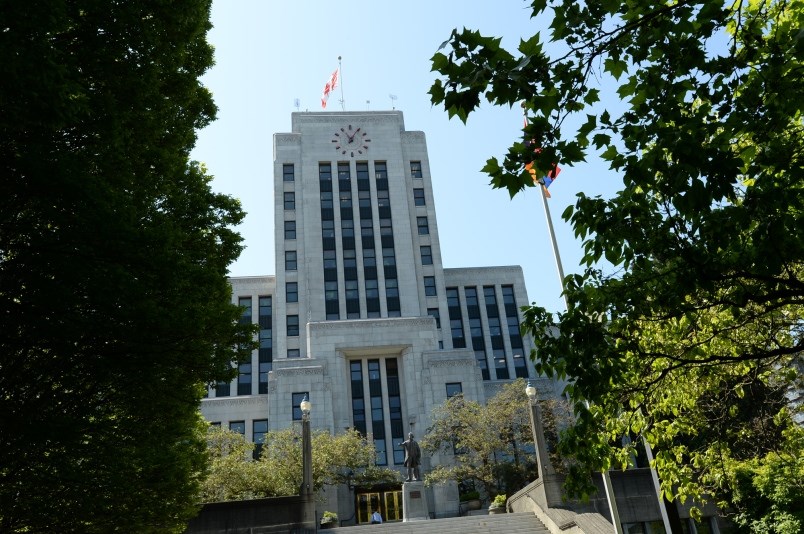Vancouver city council now has an idea of what it can cut and spend if it chooses next week to decrease a proposed property tax hike of 8.2 per cent for 2020.
City staff presented additional property tax hike scenarios Wednesday for council to consider on what will be lost or gained if a tax increase was set at five, six or seven per cent.
Two scenarios were provided for the six per cent scenario.
Council requested the scenarios Tuesday after it referred debate and decision on the $1.6 billion budget to Dec. 17. The request was clear that the scenario with the lowest hike be no less than five per cent.
The scenarios are based on what property tax pays for and doesn’t include fees and other revenue to the city. The scenarios are not an absolute prescription for council to base its final decision, but a guide.
Highlights of what a seven per cent tax hike means:
• A reduction of $9 million from proposed budget.
• Overall delay in hiring new employees by two months.
• That includes delays in hiring 30 firefighters and 25 police officers, along with 15 staff between the two departments.
• City-wide plan work reduced from $5.5 million to $4 million.
• Scale back additional street cleaning by half.
• Delay seismic upgrade funding for firehall number 12 by three months into the new year.
• Reduce “innovation fund,” which paid for such items as city’s participation in Women Deliver 2019 conference.
• Increase parking meter revenue, which could include raising the cost to park and the installation of new meters in the city.
• Remove additional $1 million in funding to address Oppenheimer Park homeless camp next year, which park board announced this week is working to get an injunction to clear the park.
Highlights of what a six per cent tax hike means (scenario A):
• A reduction of $17 million from the proposed budget.
• Delaying the hiring of police officers and firefighters by two months.
• Hold vacancies in the engineering department.
• Defer some capital projects.
• Increase parking meter revenue.
• Reduce storm and snow reserve fund.
• Eliminate innovation fund.
• No additional funding to address homeless encampment in Oppenheimer Park.
• No funding for additional street cleaning.
• Reduce special events funding.
• Funding for energy retrofit incentives to building owners reduced by $1 million.
• No extra library hours, reduction in branch hours if delay in hiring staff.
• Free swim lesson program deferred to future years.
• No improvements to washroom and building maintenance services, including more frequent cleaning.
• A reduction in funding for city work on heritage and reconciliation, and anti-Black racism.
• No administrative support for park board commissioners.
• Reduce discretionary spending.
Highlights of what a six per cent tax hike means (scenario B):
• A reduction of $17 million from the proposed budget.
• Cutting approximately half of firefighters and police officers requested by each department to be hired in 2020.
• Hold vacancies in the engineering department.
• Defer capital projects.
• Increase parking meter revenue by $1.1 million.
• Reduce storm and snow reserve fund.
• Eliminate innovation fund.
• No additional funding to address homeless encampment in Oppenheimer Park.
• No funding for additional street cleaning.
• Reduce funding for community policing centres.
• Removing or “descoping” of proposed work related to poverty reduction, diversity and equity.
• Reductions to the city’s work on heritage and reconciliation, anti-Black racism, an apology to the South Asian community for historical wrongs and an urban Indigenous healing and wellness grant.
Highlights of what a five per cent tax hike means:
• A reduction of $25 million from proposed budget.
• Cutting approximately half of firefighters and police officers requested by each department to be hired in 2020.
• Increasing parking meter revenue by $1.1 million.
• No extra library hours and reductions to branch hours.
• No funding for additional street cleaning.
• Reduce storm and snow reserve fund.
• Fund city-wide, “CultureShift” and climate change plans at reduced levels.
• Free swim lesson program deferred to future years.
• No improvements to washroom and building maintenance services, including more frequent cleaning.
• No additional funding to community policing centres.
• Reduce climate change work from $6 million to $3 million.
• Reduce work in Chinatown related to its economy.
• All recommended programs and initiatives related to the city’s social issues and diversity section be removed. That includes poverty reduction work and deferring all work on discrimination and anti-racism.
• No funding for additional street cleaning.
• Reduce special events funding.
• Deferring some capital projects.
• Reduce innovation fund.
• Don’t hire heritage planner.
Council will reconvene Dec. 17 at 9:30 a.m. to decide on which property tax increase will be in place for 2020. Whatever the increase, it doesn’t include the increases to sewer, water and solid waste fees.
@Howellings
Read more from the Vancouver Courier




